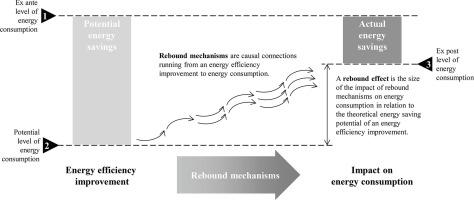Energy Research & Social Science ( IF 6.9 ) Pub Date : 2021-03-07 , DOI: 10.1016/j.erss.2021.101982 Steffen Lange , Florian Kern , Jan Peuckert , Tilman Santarius

|
Literature on the rebound phenomenon has grown significantly over the last decade. However, the field is characterized by diverse and ambiguous definitions and by substantial discrepancies in empirical estimates and policy proposals. As a result, cumulative knowledge production is difficult. To address these issues, this article develops a novel typology. Based on a critical review of existing classifications, the typology introduces an important differentiation between the rebound mechanisms, which generate changes in energy consumption, and the rebound effects, which describe the size of such changes. Both rebound mechanisms and rebound effects can be analytically related to four economic levels – micro, meso, macro and global – and two time frames – short run and long run. The typology is populated with eighteen rebound mechanisms from the literature. This contribution is the first that transparently describes its criteria and methodology for developing a rebound typology and that gives clear definitions of all terms involved. The resulting rebound typology aims to establish common conceptual ground for future research on the rebound phenomenon and for developing rebound mitigation policies.
中文翻译:

揭开Jevons悖论:反弹效果和机制的多层次类型学
在过去的十年中,有关反弹现象的文献大量增加。但是,该领域的特点是定义各不相同,模棱两可,经验估计和政策建议也存在重大差异。结果,难以累积知识。为了解决这些问题,本文提出了一种新颖的类型学。基于现有分类的严格审查,类型学介绍了反弹之间的一个重要区别机制,其产生的变化中的能量消耗,和回弹效果,其描述了大小这样的变化。反弹机制和反弹效果都可以与四个经济水平进行分析相关-微观,中观,宏观和全球-以及两个时间范围-短期和长期。从文献来看,这种类型学中包含了十八种反弹机制。该贡献是第一个透明地描述其开发反弹类型学的标准和方法,并为所有涉及的术语提供清晰定义的第一个贡献。由此产生的反弹类型学旨在为将来对反弹现象的研究和制定反弹缓解政策建立共同的概念基础。









































 京公网安备 11010802027423号
京公网安备 11010802027423号